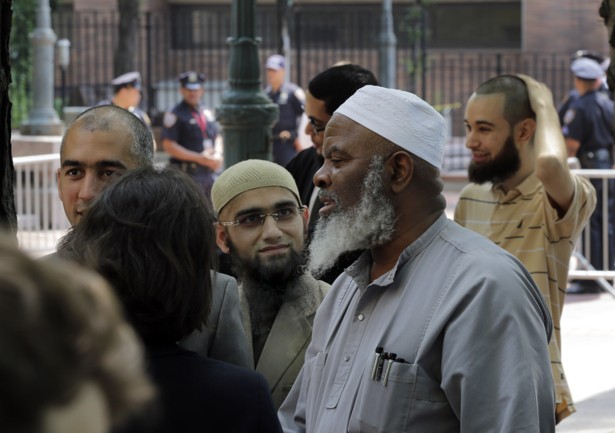The agreement will call for, among other changes, a civilian to monitor police surveillance of religious groups.

A settlement announced Thursday in two lawsuits brought over the surveillance of Muslims by the New York Police Department after the attacks of September 11, 2001, will include, among other changes, a civilian to monitor police surveillance of religious groups.
The city does not admit to any wrongdoing under the agreement in the two cases—Raza v. City of New York and Handschu v. Special Services Division. Both agreements are subject to court approval.
The Raza suit charged the NYPD of violating the Constitution by singling out New Yorkers based on their religion. The case sought systemic reforms to prevent law enforcement abuses. In Handschu, lawyers argued the investigations of Muslims violated the long-standing consent decree in that case. The New York Times has the background on Handschu:
The intelligence unit began in the 1900s as the Italian Squad, with a focus on suspected anarchists. Over the decades, it shifted focus to Communists, Vietnam War protesters, student groups and civil rights organizations.A 1971 class-action lawsuit forced the end of the city’s so-called Red Squads and established the intelligence-gathering rules, known as the Handschu Guidelines, after one of the plaintiffs. The lawsuit has remained active for decades, serving as a check against police overreaching.
“We are committed to strengthening the relationship between our administration and communities of faith so that residents of every background feel respected and protected,” Mayor Bill de Blasio said in a statement. “New York City’s Muslim residents are strong partners in the fight against terrorism, and this settlement represents another important step toward building our relationship with the Muslim community.”
William Bratton, the city’s police commissioner, called the agreement a step toward building and maintaining trust with the city’s Muslim community.
Bratton, in the statement, said: “Incorporating existing NYPD practices into the Handschu Guidelines makes it easier to maintain best practices in intelligence gathering and investigations.”
The modifications bring the guidelines closer in line with the practices of the FBI.
The American Civil Liberties Union, which brought one of the cases on behalf of Imam Hamid Hassan Raza, in a statement said: “This agreement with the country’s largest police force sends a forceful message that bias-based policing is unlawful, harmful, and unnecessary.”
Among other things, the agreement prohibits investigations in which race, religion, or ethnicity is a substantial or motivating factor; requires factual information about possible unlawful activity before a preliminary investigation into political or religious activity; and ends open-ended investigations.
It also introduces a civilian to monitor police surveillance of religious groups. The ACLU adds:
Installing a civilian representative within the NYPD with the power and obligation to ensure all safeguards are followed and to serve as a check on investigations directed at political and religious activities. The civilian representative must record and report any violations to the police commissioner, who must investigate violations and report back to the civilian representative. If violations are systematic, the civilian representative must report them directly to the judge in the Handschu case.
You can read the agreement here.

This should have been thrown out by the court. The Constitution does not protect Islam. Islam calls for the overthrow of our Constitution not on religious grounds but based on hate of all that is not Islam. Advocates of perpetrating murder and the overthrow of the US government can not hide behind the cloak of religion.
ReplyDelete